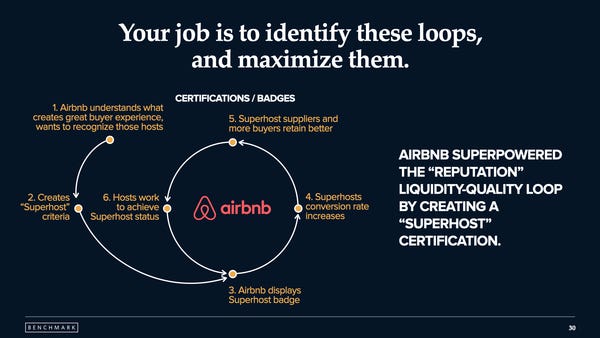Stealing Signs - Issue 26
Tipping Your Marketplace, From FOMO to FOLD, VC Incentives, The Rise of Social eCommerce, 10 Years of Supercell, & Tock Raises $$
Worth Reading
Tipping Your Marketplace
Sarah Tavel, Benchmark

This short deck offers great insight into how to “tip” a marketplace, which is not just about acquiring supply and demand, but getting buyer and seller to consistently transact with each other at scale, or marketplace liquidity. Liquidity, or happiness as Sarah calls it here, is achieved by accelerating “tipping loops,” which are the flywheels that help maintain and grow the marketplace liquidity. She identifies two tipping loops to hone in on: growth loops, which make it easier to acquire supply or demand, and retention loops, which improve the quality of supply.
My favorite example of accelerating a tipping loop is Airbnb’s “Superhost” badge, which accelerated the retention loop by improving the quality of sellers, or hosts. Airbnb understood what created the best guest experience and wanted to recognize the hosts who delivered this experience. They created the “Superhost” badge not only to recognize these hosts, but as a clear indicator of the behavior they wanted from all hosts on the platform: responsive to guest inquiries and a high guest rating. The badge incentivized hosts to behave this way, which many did after it was introduced, as guests would seek out “Superhosts” for high quality service and the “Superhosts” would appear higher in search. This meant a higher conversion rate and more money for the hosts, which increased Airbnb’s host retention.
On the guest side, as more hosts pursued the “Superhost” badge, the overal quality of hosts on the platform increased. Higher quality hosts meant a better experience for guests, which increased Airbnb’s guest retention.
From FOMO to FOLD in Early Stage Venture
Rob Go, NextView Ventures
Firms will start to torture founders with endless diligence requests. Funds that may actually not have much capital to deploy will string founders along so that they appear to be active in the market while they are buying time before their next fundraise. The desire to take more time to get to know founders and the difficulty of in person meetings will have a multiplicative effect on the painfulness of an investor’s decision-making.
Rob nails it here. The changes to early-stage VC outlined in this post are already happening and are very likely continue until there’s more clarity about COVID’s impact on the economy. While shift from FOMO to FOLD is in full swing, I’m not convinced all of the shifts Rob identifies will last the duration of the lockdowns and economic uncertainty caused by COVID.
For example, Rob suggests early-stage investors may retreat to investing mostly in geographies they’re comfortable with as COVID plays out, reducing their investments in “non-core geographies.” Pitchbook data suggests this is definitely happening. Seed and Series A deals in the Midwest and Great Lakes regions were down ~75% from March to April and ~50% from April to May. In the Bay Area and New York Metro Area, which has the highest concentration of early stage investors, Seed and Series A deals were down just ~33% from March to April and ~50% from April to May. However, I believe that the areas most early-stage investors are “comfortable” investing in, largely SF and NYC, will decreasingly represent the areas which produce successful early stage companies as geographical advantages vanish due to COVID lockdowns. I don’t see investors reverting to comfortability in making investment decisions for long if the distribution of venture-backable companies increasingly spreads across a range geographies, including “non-core.”
VC Incentives: Logo-Hunting and Optionality
Byrne Hobart, The Diff
The goal of talking to an associate is to convince a decisionmaker, and the associate can shape that decisionmaker’s view. And the sales job for a hot round is a lot easier for the associate than an odd company would be. If the deal has been validated by somebody else, the investment decision just hinges on making sure other funds didn’t miss anything glaring.
This is actually a great explanation of what it’s like to be a VC associate. Frankly, the popular deals in the midwest don’t tend to be what “hot” deals on the coasts are like — tons of VC interest and momentum behind a company forcing Associates to chase founders and expedite diligence. In my experience, hot deals in the Midwest are not nearly as frantic nor as competitive as the coasts. It’s often a more collaborative process, which means Associates and VC firms aren’t usually battling it out for deal allocation.
Pinduoduo & The Rise of Social eCommerce
Anu Hariharan and Nic Dardenne, Y Combinator
Pinduoduo now hosts in-app games to help drive up daily time spent on the platform. The first popular game on Pinduoduo was Duo Duo Orchard. Think of Farmville except now the rewards are real physical goods. The game is simple – a user creates and nurtures a virtual fruit tree to eventually yield a real box of fruit shipped to his or her address. It already has more than 11M DAUs!
Though not multiplayer, Orchard has social cooperation aspects that drive up network engagement as well. Once users choose a tree to create (e.g., mango, lemon, macadamia nut), they need to nurture the tree with water and fertilizer. The more you shop on Pinduoduo the more water droplets you receive to nurture your tree.
With 2 investments in the food & bev space and the rapidly shifting restaurant landscape due to COVID, we spend a lot of time thinking about the food value chain, emerging ingredients and CPG products, and various on-demand models. Pinduoduo innovated one of the most interesting models in the food space by leveraging their social eCommerce platform, specifically the “team purchase” feature, to sell fruit and vegetables. Incumbent’s in this space were focused on non-perishable goods, which meant there was a gap in perishable goods, and fruit & veg are low order value/high transaction frequency goods, which meant users would come back to the platform more regularly than for clothing or electronics. The “team purchase” feature comes into play as users who found a great deal would share it with their friends to create a team of buyers which qualified them for a bulk discount. The group creator then received free produce as a reward for acquiring new users for Pinduoduo.
The social eCommerce model with team purchasing is quite intuitive for apparel and electronics, but not immediately so for produce. Though the authors mention team purchasing may never catch on outside of eCommerce in China, I think it could have legs in the food space. COVID has strained the existing grocery and food delivery infrastructure which is beginning to push consumers to go directly to vendors and farmers for meat and produce. A long-standing issue with the direct-to-vendor model is the inflexibility of pack sizes, or the quantity of a single sku (e.g. I want carrots from an organic farm but the farmer only sells carrots in 10lb increments). The team purchasing feature would enable a single buyer to quickly organize a large group of buyers which, 1. lowers the cost for consumers, and 2. may be enough to subsidize the costs of lowering pack size minimums and associated shipping costs for vendors, thus creating a simple and easy way for consumers to buy direct from vendors.
Zooming out, I'm excited to track Pinduoduo over the coming months as they pioneer social eCommerce in what are arguably ideal market conditions for the model.
10 Learnings from 10 Years of Supercell
Ilkka Paananen, CEO of Supercell
The most important factor that our teams look at when they test our games in beta phase is how long players keep playing the game. That’s ultimately all our teams care about…
This means that we don’t only kill games in beta, we kill good games. Great examples would be Smash Land and more recently Rush Wars - both very polished fun games that received positive feedback and excitement early on. But they weren’t games that people would play for years, so their development teams decided to kill them. They decided that instead of developing their games further, their time is best spent developing a new and better game.
Ilkka gives us a peek behind the curtain of what makes Supercell — the top mobile game developer in the world — Supercell. This post is a great example of the impact a strong company culture has on performance, speed, and longevity — the degree to which this is true for Supercell is quite impressive.
Ilkaa’s approach to hiring, team formation, and his role as CEO reminds me of Tobi Lutke, CEO of Shopify. Specifically Ilkaa’s desire to be the least influential CEO of all time:
in an ideal world, the teams would make all the decisions which means that I would make none. This is what I mean when I say that my goal is to be the world’s least influential CEO.
While Tobi doesn't quite phrase it like this, I detect a similar sentiment in his approach to decision-making, which I covered in issue 24 of Stealing Signs. In short, Tobi doesn’t insert himself in the majority of decision-making processes at Shopify. Instead he trusts and respects his team’s ability to make decisions and, like Ilkaa, says some of best things have happened without his involvement.
<stuff> Weekly
LOL Weekly: If you don’t look at it, it won’t be a hit
lol been there before
Funding Weekly: Tock
Kokonas said the restaurant served more than 1,300 meals on Mother’s Day, and that the increased business in recent weeks has allowed him to reemploy 100% of his staff.
Chicago reservation and delivery technology startup, Tock, raised $10M from Origin Ventures and Valor Siren Ventures, Valor Equity’s $400M fund focused on early-stage food, food technology, and retail technology, with an anchor investment of $100M from Starbucks. CEO Nick Kokonas confirmed that Tock’s valuation has doubled since their last round, putting their current valuation near $100M.
This is one of my favorite Chicago startups because they’re revolutionizing the way consumers engage with restaurants and farmers. World class restaurants like Alinea and Spago are now accessible to almost anyone and consumers can now easily purchase fresh, high quality produce directly from farms.
Baseball Weekly: Five-Round MLB Draft
Kendall Rogers, D1 Baseball
“With a five-round draft, I’d fully expect it to be very college heavy because MLB teams will want that longer track record of success than just two-to-four looks from a high school kid,” an SEC recruiting coordinator said. “I think this pushes a lot of talent into Division I, but also the JUCO ranks. I think the JC ranks will be stronger than ever because of this.”
This is an interesting look at how the recently overhauled MLB draft (5 rounds, anyone not drafted can sign as a free agent for $20k) impacts college players and the college baseball system. Kendall suggests that college programs, specifically junior colleges, will be stronger than ever since most players’ only other option will be a $20k check. It doesn't make much sense for highschoolers or draft-eligible college sophomores and juniors to sign if they aren’t selected in the shortened draft, which means players who’d typically leave early will return for additional college seasons — a significant win for college programs.
Art Weekly: Got Your Back
An ever growing collection of virtual backdrops for use in video call apps. Expressions of optimism and art by the world's best designers, illustrators, animators, photographers, filmmakers and artists.
Amsterdam-based creative agency staat put together some insanely cool virtual backgrounds on a new site called Got Your Back. My favorite is this picture of Hotel Norge’s lobby:






